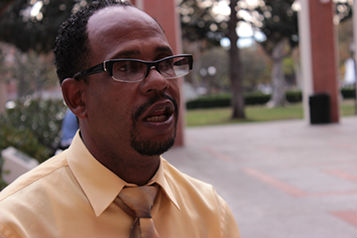Alzheimer's in Baldwin Hills
Alzheimer's on the Rise in Baldwin Hills, L.A. County
by Faith Miller
Annenberg School for Communication and Journalism
The number of people who died from Alzheimer's in 2010 in Los Angeles County is more than double the number from a decade before, despite falling death rates.
This trend carries into Baldwin Hills as well, according to the Alzheimer's Association's Southland Chapter's Director of Education Susan Howland.
Howland said as people live longer, especially in the heavily African American and Latino community of Baldwin Hills, they are more likely to develop, and then die from, Alzheimer's. "We see the population surviving what used to kill us," Howland said. "We survive cancer, we live with heart disease, and we survive a stroke. It allows people to live longer, so they are more at risk for developing the disease."
The death rate for Los Angeles County fell 19% from 2001 to 2010, according to a report released by the Los Angeles County Department of Public Health in early December. The number of deaths from Alzheimer’s disease, however, more than doubled during this time from 905 in 2001 to 2,242 in 2010, according to the report.
For graphs of the findings of the California Department of Public Health report, click here.
 Alzheimer’s is especially dangerous in Baldwin Hills because people there don’t always recognize the symptoms, Howland said. “A lot of people from that area don’t recognize Alzheimer’s as a disease and will frequently wait three, four, five years after the first signs and
Alzheimer’s is especially dangerous in Baldwin Hills because people there don’t always recognize the symptoms, Howland said. “A lot of people from that area don’t recognize Alzheimer’s as a disease and will frequently wait three, four, five years after the first signs and
symptoms to go to the doctor,” Susan Howland says the Alzheimer's Association tailors Howland said.
its programs in the Baldwin Hills area to the primarily
African American and Latino community. (Faith Miller)
Bryan Gaines grew up in the area and was a caregiver to his father after his father developed Alzheimer’s, and he said his family frequently denied or ignored symptoms of the disease. “It was hard to get used to the fact that it was actually a disease,” Gaines said. “For so long, it didn’t mean anything. [Relatives with Alzheimer's] were just old, crazy and senile.”
Gaines took care of his father after it became clear he could not live on his own. The toll Alzheimer's and becoming a caregiver took on Gaines' life, and the people he met who faced the same struggles he did, inspired him to start working for the Alzheimer’s Association, where he is now in charge of professional development. “I really wanted to make a change,” he said. “I was inspired by the lack of awareness and the lack of services.”
For more on Bryan Gaines' story, click here.
 Gaines said the African American community, and other minority communities, are especially plagued with a lack of education about Alzheimer's. He says people don't know how to diagnose, and then cope with, the disease. “We don’t see a whole lot of people getting in during the early
Gaines said the African American community, and other minority communities, are especially plagued with a lack of education about Alzheimer's. He says people don't know how to diagnose, and then cope with, the disease. “We don’t see a whole lot of people getting in during the early
stages of the disease,” Gaines says minorities with Alzheimer's don't have enough resources to Gaines said. “I would like learn about the disease. (Faith Miller).
to see people participate in the choices that need to be made for their lives. People come in after a crisis, and it’s always someone else making decisions for them.”
That was the case with Gaines’ own father, who wasn’t diagnosed until he was sent to the hospital, and couldn’t live on his own when he was released. Howland said this is happening all too often, and it doesn’t just keep people from making their own end-of-life decisions. “It’s really important for people to get diagnosed early,” Howland said. “The medication, which is very limited right now, is really most effective for people in the early stages.”
The Alzheimer’s Association tries to spread awareness of the disease and also provide resources to caregivers and patients. “We have support groups,” Howland said. “We have classes specifically for family members to help them be a caregiver because it’s not a role any of us are really familiar with.”
The association also supports research into the causes and possible cures of Alzheimer’s. Howland said there’s just not enough information yet on why people get Alzheimer’s and how to stop it once they do. “There hasn’t been substantial research around these risk factors that would allow us to say, ‘exercise and you won’t have Alzheimer’s,’” Howland said. “I think that’s the research piece that’s still missing.”
While scientists work to eradicate the disease, Howland continues to reach out and help the families of Alzheimer's patients. “Right now, the real need is these family caregivers,” Howland said. “80% of people with Alzheimer’s are cared for at home by family members. That’s a significant part of this community.”
Questions or comments? Email the author.
